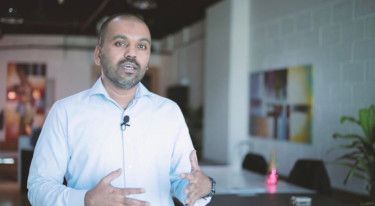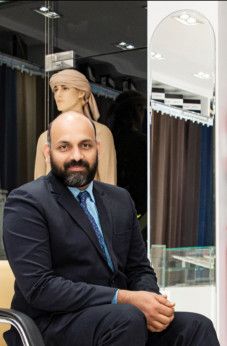Dubai: Learning Arabic becomes a passion or necessity for several expats once they make the UAE their second home. However, there are some expats who have arrived here after mastering the language of the land back in their home countries where Arabic is a foreign language. Their love for Arabic and in-depth knowledge of the language have stood them in good stead as a gateway to jobs in the UAE, including those in government departments.
Gulf News introduces to its readers three such expats from the South Indian state of Kerala where Arabic classes are offered in various schools, with higher level courses and even degrees offered in some colleges and universities.

Image Credit: Supplied
He has an MPhil in Arabic
Ismail Meladi started learning Arabic from Grade 1. That was way back in 1967 when he began his schooling at the age of five. “However, it was optional when I reached grade five. But my parents preferred Arabic over my mother tongue Malayalam in keeping with the advice of a teacher, who was our neighbour and relative,” said Ismail. Naturally, after his schooling, he opted for Arabic as his second language for his pre-degree course.
“I took History and Arabic as double main for my BA degree, in which I received third rank in the university. This prompted me to continue with Arabic for my master’s degree in Calicut University. I went on to do an MPhil in Arabic and aimed at doing PhD. However, I dropped the plan for a doctorate when I got selected for a postgraduate degree in journalism, which was my ambition,” Ismail said, recollecting his long journey of learning Arabic.
Though learning Arabic was never a challenge for him, he did find some difficulties in following the post-graduation classes as the lecturing was in Arabic instead of English, which was the medium of instruction until then. “But, I caught up with it and I went on to win the first prize for essay writing in Arabic in the university.”
How Arabic helped him land job in the UAE
However, it took several more years for Ismail to set off for the UAE as he initially worked as a journalist in New Delhi for ten years.
“When I was working as the bureau chief of a Kerala-based newspaper in Delhi, I got selected to work as a senior reporter/chief sub-editor in an English daily in Sharjah. In fact, they were looking for a reporter who knew Arabic,” Ismail said while detailing how he landed in the UAE.
Speaking of how his proficiency in Arabic helped him in many ways, he said: “Most of the press briefings here would usually start in Arabic. I could understand the questions and answers that were exchanged between the Arabic journalists and the organisers. This helped me get extra points for my stories. When I worked on the desk, I used to translate many Arabic press releases myself though there were designated translators in office. Even during interviewing many local officials, my Arabic came in handy.”
Currently, Ismail is working as a senior media officer with Dubai Municipality, where he was first offered a job more than 15 years ago, considering his prowess in Arabic. “They were looking for a media person who could translate the reports from Arabic to English as well as review and proofread all their publications,” he said.
Writing poems in Arabic
A writer-cum-poet in English and Malayalam, Ismail has also used Arabic for his creative writing.
“I have published my poems in Arabic and became the first Indian to be invited to present poems in Arabic at the UAE Writers’ Union. I had the good fortune to get introduced to many leading Emirati and other Arab poets. I used to receive invitations to many Arabic poetry-reading events. Ever since I started translating many local poems into my mother tongue Malayalam, I became a bridge between the two cultures. I have been regularly introducing Emirati poets to the Indian community in the UAE,” Ismail said.
Lure of jobs, love of language
Like many Muslims from Kerala, Naseem Hamza Ahmed started learning Arabic as advised by his father, considering the plentiful job opportunities in the Gulf countries. “But when I started learning it, I forgot about the prospects of a job and fell in love with the beauty of the language as I started reading classical Arabic books and novels,” he said. Naseem said he started learning Arabic seriously after his 10th standard though he had already learnt reading and writing from an Islamic madrasa from grade one — like almost every Muslim child.
“After completing my degree in Arabic, I did post-graduation in Arabic Literature from Calicut University and a PG Diploma in Journalism and Mass Communication from Madurai Kamaraj University.”
Multiple profiles
After his stint as a translator-cum-administrator in a Gulf country, Naseem reached the UAE in 2010 to work for a leading firm in Dubai. Next year, he joined Dubai Municipality’s media section where he worked for three years.
Naseem also had a two-year stint at a government office as a media coordinator-cum-administrator.
Currently the chief editor of Al Hindiya Arabic online portal, Naseem also offers Arabic coaching online. His lessons include Emirati Arabic and modern standard Arabic. Under his ‘Easy Arabic with Naseem’ programme, he teaches around 100 Indian expatriates.
“I am also a member of Arabic Toastmasters, through which I could learn a lot more and understand about the broad-minded culture of Emiratis and other Arab nations. I have earned many Arab friends who read my articles on my portal.”
Father’s eternal love
For Bishruddeen Sharqi, the first Arabic guru was his father Abul Bashayir Mohammed Ali Sharqi, who, he said, “loved the language more than anything in his life”.

Image Credit: Supplied
“He had learnt it from his father and from other masters in the Masjid-based institutions called Palli Dars in Kerala. My father had an in-depth knowledge and he had developed his own teaching method of Arabic, following a 30-year amateur research till he breathed his last in 2014.”
He said his father’s “eternal love” towards the language can be seen in the large group of men and women who were inspired by him to learn Arabic and also from the names of Bishruddeen and his ten siblings. “All of our names are derived from the Quranic word “Bishr”, which means good news. Bishruddeen’s first course in the language was taken by his father when he entered grade five in the official schooling system. “That was conducted in the evenings once classes in school and the subject revisions were over,” he recollected.
“To continue learning under my father seemed tough back then. But when I recollect my journey with the language, I value that the most,” he said. He went on to do a degree course in Arabic and got exposure in a more academic environment where Arabic had prime importance.
Jobs in the UAE
“In 2011, I got my first job in the UAE, where Arabic was the primary requirement to get the job. I was appointed in Dubai Municipality Media Department as a journalist and media officer, which I enjoyed like anything. It provided me a good opportunity to meet wonderful leaders in the 33 departments and to translate their vision and programmes.”
“Later, I joined the Abu Dhabi Food Control Authority where I had a similar exposure and opportunity to engage in language and communication, in addition to indulging in what we can call cultural learning, which is an essential product of linguistic interactions,” said Bishruddeen.
He currently works as a corporate relations manager with Telal Gents Fashion, where he is continuing with his engagement with the language and the cultural traditions of the UAE. His former colleagues at Dubai Municipality, Naseem and Bishruddeen, also founded Lingo Orbit, a company specialised in Arabic content production, marketing and translation services.
Why should we learn Arabic?
“Many of us have been working in the UAE for decades. However, the relationship between us and the people of this country often get confined within official communications only,” pointed out Ismail.
“If we learn their language and literature deeply, rather than just having skills in the spoken language, it will not only be advantageous to our profession, but we will be able to know the culture closely. It will lead to deeper understanding and friendship with the citizens of this lovely country. I have enjoyed the warmth of the people of this country more often. When they learn that I write poems in their language, they respect me even more. So, learn Arabic and know the people of the UAE closer,” he added.
Naseem said: “Arabic will not at all be a difficult language once you start loving it. It reflects the rich culture of the Arab world and its tolerance, apart from the highly paid multidimensional job opportunities available across the Gulf countries. Emiratis greatly respect the non-Arabs who speak Arabic fluently and consider them as their close friends and brothers,” he added.
Bishruddeen said Arabic is an awesome language with deep roots in history and never compromises on its classical essence.


